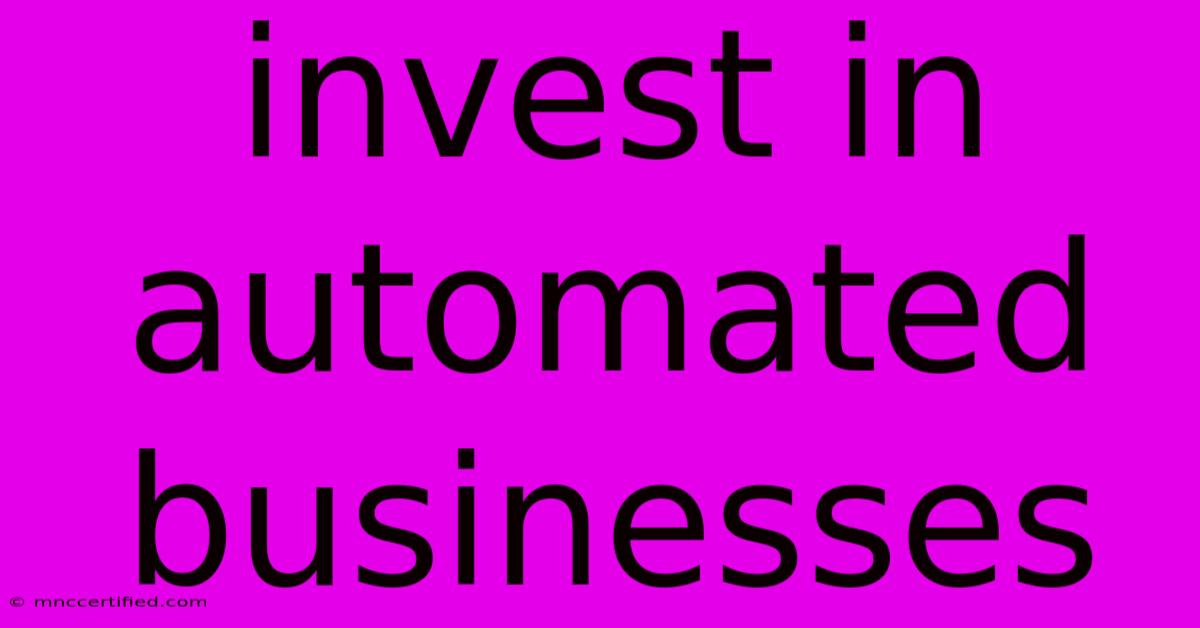Invest In Automated Businesses

Table of Contents
Invest in Automated Businesses: A Path to Passive Income and Scalability
The dream of passive income is alluring. Working less while earning more – it sounds too good to be true, right? While completely passive income is rare, investing in automated businesses offers a strong path towards significant financial freedom and reduced workload. This article explores the benefits, risks, and key considerations for investing in this lucrative sector.
What are Automated Businesses?
Automated businesses leverage technology to minimize manual intervention in their operations. This doesn't necessarily mean fully robotic factories (though that's a possibility!), but rather employing software, systems, and processes to automate tasks like:
- Customer service: Chatbots, email automation, and help center knowledge bases handle routine inquiries.
- Marketing and sales: Automated email marketing, social media scheduling, and online advertising campaigns run with minimal human oversight.
- Order fulfillment: E-commerce platforms integrate seamlessly with warehousing and shipping services.
- Inventory management: Software tracks stock levels and automatically reorders when necessary.
- Financial reporting: Automated systems track expenses, revenue, and profits.
Essentially, automated businesses streamline operations, allowing owners to focus on strategic growth rather than day-to-day management.
Benefits of Investing in Automated Businesses
Several compelling advantages make automated businesses an attractive investment:
- Scalability: Automation enables rapid scaling without proportional increases in labor costs. Expand your market reach and increase revenue efficiently.
- Reduced Operational Costs: Automation minimizes the need for a large workforce, resulting in significant cost savings.
- Increased Efficiency: Automated systems work 24/7, optimizing processes and improving productivity.
- Improved Consistency: Automation ensures consistent quality and service delivery, reducing errors and enhancing customer satisfaction.
- Potential for Passive Income: While not entirely passive, automation significantly reduces the time required for active management, creating more free time and passive income streams.
Types of Automated Businesses to Consider
Several business models lend themselves particularly well to automation:
- E-commerce: Online stores selling physical or digital products are highly automatable, utilizing platforms like Shopify or WooCommerce. Keyword: e-commerce automation
- Software as a Service (SaaS): Recurring subscription revenue models minimize operational overhead once the software is developed and deployed. Keyword: SaaS investment
- Affiliate Marketing: Automated email sequences and social media promotion can generate significant passive income. Keyword: affiliate marketing automation
- Online Courses and Digital Products: Create and sell online courses, ebooks, or templates with minimal ongoing effort once created. Keyword: digital product automation
Risks and Challenges of Investing in Automated Businesses
While the potential rewards are substantial, investing in automated businesses carries inherent risks:
- High Initial Investment: Developing and implementing automation systems can require a significant upfront investment.
- Technological Dependence: Reliance on technology exposes businesses to potential disruptions from system failures or cyberattacks. Keyword: cybersecurity for automated businesses
- Maintenance and Updates: Software and systems require ongoing maintenance and updates, incurring costs and demanding attention.
- Competition: The increasing adoption of automation means competition can be fierce.
- Lack of Personal Touch: Over-reliance on automation can sometimes lead to impersonal customer experiences.
Due Diligence Before Investing
Before investing in any automated business, thorough due diligence is crucial:
- Market Research: Analyze market demand, competition, and potential for growth.
- Financial Projections: Develop realistic financial projections, considering startup costs, operating expenses, and potential revenue streams.
- Technology Assessment: Evaluate the robustness and scalability of the technology used in the business.
- Management Team: Assess the experience and capabilities of the management team.
- Exit Strategy: Consider how you plan to exit the investment in the future.
Conclusion: A Smart Investment Strategy
Investing in automated businesses presents a compelling opportunity for those seeking financial freedom and scalability. By carefully considering the benefits and risks, conducting thorough due diligence, and adopting a strategic approach, investors can significantly increase their chances of success in this dynamic and rapidly growing sector. Remember to constantly adapt and improve your automation strategies to stay ahead of the curve. The future of business is automated, and smart investors are already taking advantage of it.

Thank you for visiting our website wich cover about Invest In Automated Businesses. We hope the information provided has been useful to you. Feel free to contact us if you have any questions or need further assistance. See you next time and dont miss to bookmark.
Featured Posts
-
Fair Winds Capital Investments
Nov 28, 2024
-
Rooney Blasts Derby Performance
Nov 28, 2024
-
Thanksgiving 2024 Open And Closed Businesses
Nov 28, 2024
-
Yellow Fog Warning Multiple Areas
Nov 28, 2024
-
Ikko International Trading Llc
Nov 28, 2024